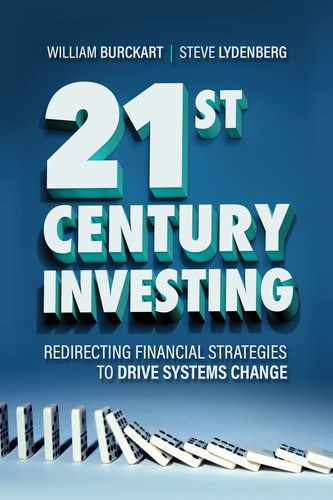Preface
IT’S TIME for a new way to think about investing, one that can contend with the complex challenges we face in the 21st century.
Investment today has evolved historically from a basic, conventional approach (concern about the risks of security selection and portfolio risk management) to embrace as well sustainable investment (intentionally achieving social and environmental benefits along with financial returns). Building on this integration of sustainability factors, it can now transition to a third stage that recognizes both the power of investments to impact social, financial, and environmental systems and the complexity of the times we live in. We call this system-level investing.
System-level investors believe that it is time to support and enhance the health and stability of the social, financial, and environmental systems on which they depend for long-term returns. They preserve and strengthen these fundamental systems while still generating competitive or otherwise acceptable performance.
This book is for those investors who believe in that transition. They may be institutions, large or small, concerned about the long-term stability of the environment and society. They may be individual investors who want their children and grandchildren to inherit a just and sustainable world. They may have already adopted sustainable investment strategies and be ready to transition to system-level investment. Or they may never have considered alternatives to a conventional approach.
Whoever they may be, they will find the what, why, and how of this transition in these pages: what it means to manage system-level risks and rewards, why it is imperative to do so now, and how to integrate this new way of thinking into their current practice. In particular, the book provides investors with a process for setting goals, deciding where to focus, allocating assets, applying investment tools, leveraging advanced techniques, and evaluating results. It helps investors build on their current practice and, by incorporating system-level perspectives, better align the investments of today with society’s long-term goals.
When we say systems, we are talking about those large social, financial, and environmental foundations of society necessary for any successful investment. At the broadest levels, social systems include healthcare, food and water security, fair employment, freedom of expression, consumer safety, economic and environmental justice, and education and training. Financial systems include fair and honest markets, access to basic services, and transparency of data. Global environmental systems include climate stability, natural resources, oceans and fresh water, forests, and arable land. These large systems are in turn made up of subsystems. All are interconnected and ultimately impact one another.
Understanding these systems—and ensuring their resilience—is more important than ever. Because we live in an increasingly populated, complex, and interconnected world, a disruption in one can cause multiple others to fall like dominos in a line.
When we refer to investing, we include finance in all its forms (stocks, bonds, real estate, venture capital, and lending of various sorts, among others) and styles (growth, value, emerging markets, large or small scale, and the like). We are talking about Investment with a capital I.
When we refer to system-level investors, we could be referring to all investors because all investments have impacts and implications for social, financial, or environmental systems. We use the term here more narrowly, however. We mean those who intentionally set out to manage their impacts on the largest, most important global systems. They deliberately adopt investment strategies that seek to minimize systemic risks at these levels and promote opportunities for system-wide rewards.
Some in the investment community today have already set off down the road to a genuinely system-oriented approach, but few are yet fully committed. Those making progress adopt tactics such as investing in portfolios entirely targeted or heavily weighted toward social and environmental solutions and advocate for public policies that reduce systemic risks and advance the health and resilience of crucial systems. They engage at industry levels to set standards and norms. They collaborate with others to amplify their influence. And they set clear goals for system-level (not simply portfolio-related) progress and report on their contributions to the achievement of these goals.
It is now time for a new era of investing with a vision that expands beyond individual returns and beating the performance of your neighbor. Most people don’t trust Wall Street anymore. The “greed is good” mantra rings false. And there is a burgeoning interest among a wide range of investors in generating positive social and environmental returns along with profits.
By calling this approach system-level investing, we want to be clear: a primary responsibility of 21st century investors—whether individuals, families, or institutions—is to ensure that their investments intentionally support the health and resilience of crucial systems, reduce systemic risks, and promote opportunities for all.
Doing so is not only what investment should be but what it must be if the financial community is to do its part to avoid a multiplicity of collapses and crises that will threaten our complex world in the coming decades.
Today, investors of all sorts have the opportunity to become part of this important transition and early adopters of a flagship movement.
